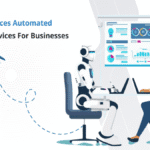
The current digital age has positioned companies in ever-increasing approaches to remaining competitive and more efficient. Cloud integration services are one of the most efficient solutions. These services offer unified on-premises applications with those of the cloud-based applications, thus enabling improved data management, collaboration, and even scaling. As organizations become more dependent on digital tools, cloud application integration is the only approach that can help organizations boost their operations, introduce better customer experiences, and drive general productivity. It’s time to explore the best advantages of modern cloud application integration services to companies.
Why Cloud Integration Services Matter for Modern Businesses?
Cloud integration services assist companies in bridging the gap and unifying the data on their various platforms, systems, and computer software. As companies are moving their legacy systems to cloud-based solutions, integrating the cloud application services will enable compatibility between the systems so that the data flow is adequate and correct. It is an essential change to make for businesses that desire to remain on top of the competition in a very competitive world to work in this way. This combination assists firms in attaining efficiency, enhancing productivity, and reducing the cost of operations with the aid of cloud-based and on-premise applications.
1. Improved Operational Efficiency
One of the most remarkable advantages of cloud integration services is better results in terms of operational performance. Businesses can automate their manual system, eliminate redundancies, and reduce errors using cloud apps. The resultant effect is enhanced working processes and an increased level of activity execution. The introduction of the cloud application will involve coordinating all systems, which will cooperate within the same body, so that the employees can focus on the practicality of their work. Because of this, the businesses can improve productivity and effectively utilize resources, thereby being superior in that regard.
2. Cost Savings
Cloud application integration services are relatively cost-effective. By switching to cloud solutions, businesses can save on the expenses of maintenance of on-premise hardware and software equipment and programs. In addition, cloud integration also causes businesses to only spend money on what they require, as businesses only pay per service instead of setting up unnecessary infrastructure. Cloud-based systems offer pay-as-you-go rates, which help companies take advantage of their budgets. This financial freedom is perfect when enterprises desire to grow, but they constrain their overhead expenses.
3. Enhanced Data Accessibility
Systems based on the cloud provide unique access to data. Through cloud integration services, employees can view important business information regardless of location and at any time, provided they can access the internet. This degree of accessibility is essential in business and for having remote or dispersed teams. Moreover, the cloud application integration will connect all data on the different platforms in one location and make this information freely accessible, resulting in more informed choices and improved cross-team work. Employees will be able to work anywhere and yet be highly productive.
4. Better Collaboration and Communication
No business can develop without successful teamwork. Incorporation of cloud applications enables workers to coordinate and share data easily and in real-time. It could be document-editing, project-managing, or even customer-information management. Still, cloud platforms allow work teams to cooperate on any task, regardless of where they are physically located. Cloud integration services offer applications that enable effective communication, be it file sharing, instant messaging, or collaborative software. The smooth coordination increases productivity and transforms innovation in the team, thereby producing better results.
5. Scalability and Flexibility
The businesses should be able to grow their systems as they expand. Cloud-based application development enables businesses to quickly expand their infrastructure according to requirements, so that when an upsurge in demand is realized, the business will not have to invest significantly in hardware or software infrastructure. Integration services through cloud applications enable businesses to be flexible in terms of increasing or decreasing resources as they may need, keeping them in line with the changes in the market, and thus remain agile. Cloud integration provides the flexibility a business must have to compete with the issues of additional storage, new applications, and team growth.
6. Enhanced Security and Compliance
Protecting data is very important to companies now. The security features available under cloud integration services include data encryption, auto-updating of software, and multi-factor authentication options. These are some of the features that help guard sensitive information against cyber threats and keep the company in line with industry regulations. Also, the cloud application fee facilitates the ease of filing the compliance reports as it delivers updated and precise information. Through such security measures, businesses improve their chances of preventing the breach of information and become confident of abiding by their industry’s legal and regulatory guidelines.
The Bottom Line
The cloud integration services have the potential to provide current businesses with opportunities to be competitive and flexible. Better collaboration, data security, and cost savings are the most apparent benefits of cloud application integration. Businesses adopting cloud application integration services can consolidate operations, scale, and gain insights into their operations. With the trend of cloud-based application development, a company that implements the solution will be prepared to honor the rules of the digital age, innovate, and succeed in the years to come.








